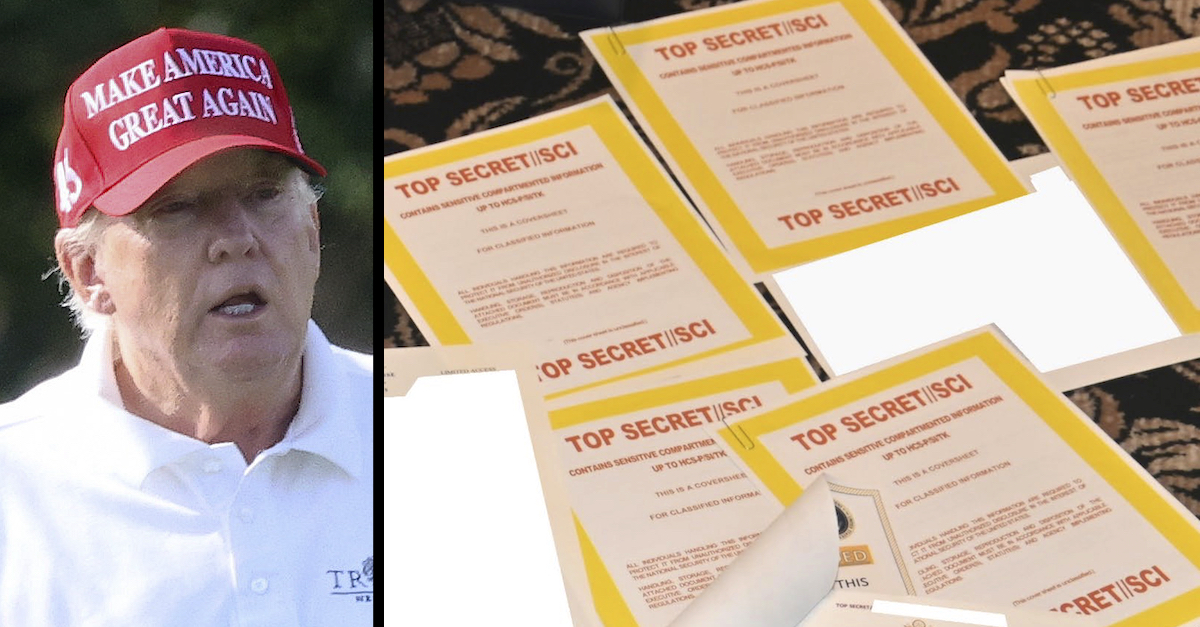
Former U.S. President Donald Trump was seen golfing on Sept. 13, 2022. Federal prosecutors filed a photo of documents recovered from Mar-a-Lago in early August 2022. (Photo of Trump by Win McNamee/Getty Images; photo of Mar-a-Lago documents via a federal court filing.)
Following a pair of brutal rulings from a federal appeals court, former President Donald Trump’s lawsuit seeking the return of thousands of files seized from Mar-a-Lago officially has been dismissed.
U.S. District Judge Aileen Cannon’s single-page dismissal order has been inevitable since she received the 11th Circuit’s mandate to close the docket.
Earlier this month, a three-judge panel — comprised of two Trump appointees and one George W. Bush appointee — found that Cannon had no jurisdiction to hear the former president’s lawsuit. Trump sued after the FBI seized tens of thousands of documents from Mar-a-Lago, including more than 200 records marked classified up to “Top Secret” and above. Search warrant materials indicate that the authorities suspect possible violations of the Espionage Act, obstruction of justice, and concealment and removal of government records.
Issuing an extraordinary injunction, Judge Cannon previously blocked authorities from using the seized documents for their criminal investigation until a special master could conduct a privilege review. That special master, Senior U.S. District Judge Raymond Dearie, now has been relieved of duty.
The 11th Circuit previously stayed the aspects of Cannon’s ruling pertaining to classified information, before overturning her order entirely based on lack of jurisdiction.
In reaching their decision, the panel found that Cannon’s ruling effectively created a criminal procedure “carve out” for former presidents.
“In considering these arguments, we are faced with a choice: apply our usual test; drastically expand the availability of equitable jurisdiction for every subject of a search warrant; or carve out an unprecedented exception in our law for former presidents,” the judges wrote in the opinion. “We choose the first option. So the case must be dismissed.”
The sole Bush appointee on the panel was Chief Judge William H. Pryor Jr. The Trump appointees are U.S. Circuit Judges Elizabeth “Britt” Cagle Grant and Andrew L. Brasher.
They implicitly described Cannon’s order as a “radical” revamp of precedent.
“We cannot write a rule that allows any subject of a search warrant to block government investigations after the execution of the warrant,” the opinion said. “Nor can we write a rule that allows only former presidents to do so. Either approach would be a radical reordering of our caselaw limiting the federal courts’ involvement in criminal investigations. And both would violate bedrock separation-of-powers limitations.”
With Cannon’s order, every hearing scheduled in the case has been canceled, and the case has been closed. Federal prosecutors, now under the supervision of Special Counsel Jack Smith, continue their investigation unfettered by any court order. That investigation appears to be heating up, amid reports that the Department of Justice has asked Chief U.S. District Judge Beryl Howell — who is overseeing federal court at the heart of the Jan. 6th investigation — to hold Trump in contempt for non-compliance with a subpoena. Howell reportedly declined to hold Trump in contempt, however.
In addition to the Mar-a-Lago investigation, Special Counsel Smith is overseeing the probe to determine whether to charge Trump in connection with the Jan. 6th attack on the U.S. Capitol.
Read the order here.